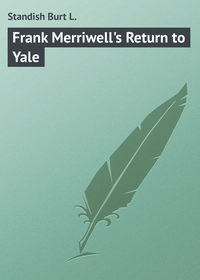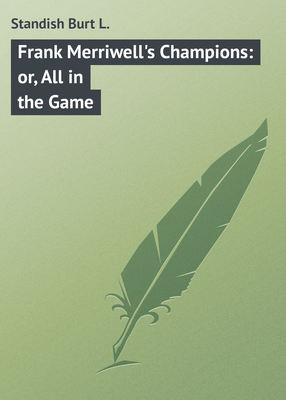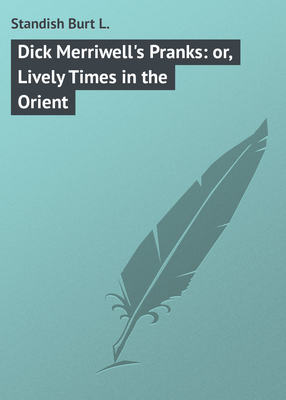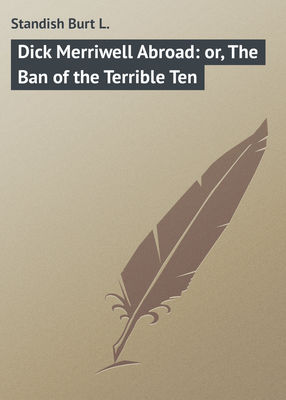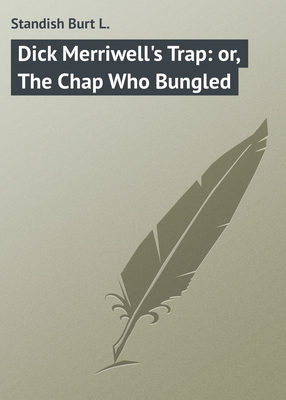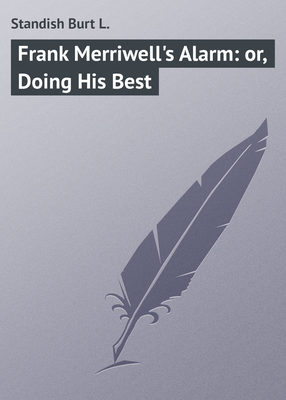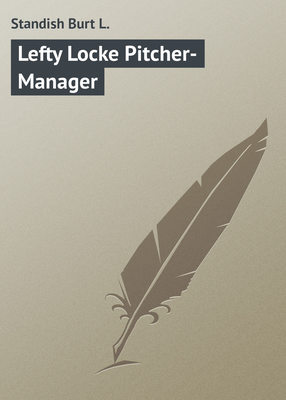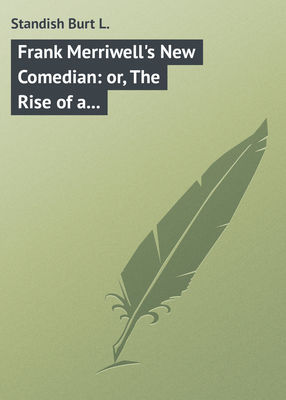Kitabı oku: «Frank Merriwell's Return to Yale», sayfa 8
CHAPTER XV
OFF THE CLEATS
"Did you say the fellow was still in the room?" asked Frank, in a low voice.
"Yes, I was sitting near the door with my head down when I heard a rustling noise back of me. I supposed I was all alone, and turned about to see who had come in. I caught sight of a fellow dodging behind that middle row of lockers."
"Who was he?"
"I don't know. Never saw him before. I thought he was a thief who was going through our clothes for watches and pocketbooks, so I made a jump and went for him. Right at the corner of the lockers my foot slipped and I went down full length. I could have helped myself from being hurt even at that if it hadn't been that the floor was so thoroughly greased that my hand slipped, and my whole weight came down on my right wrist. The pain was fearful for a moment, and it don't feel very good yet. I saw that it was a trick."
"Didn't the fellow get out?"
"No. I was bound that he should be caught somehow, and as there was too much howling outside to make myself heard, I couldn't call for help. I dragged myself to the door here, and if he had made any attempt to get by I'd have held him if it killed me."
"He may have got out of a window."
"I think not, or I should have heard him."
"We'll find out about this," said Rowland, emphatically, "but meanwhile the call is on for the tug of war with Princeton. Can you – "
The question was not completed, for Browning, with a wry face, held up his right arm.
His wrist was swollen to almost twice its usual size.
"I couldn't pull a baby," he said, regretfully.
The fellows looked blue, and Hill groaned dismally.
"Rowland," said Frank, in a quick, decisive tone, "go back into the hall and tell the committee of arrangements that our anchor is disabled, and that we shall have to have five minutes to get our substitute in order."
"Who in thunder can you substitute?" asked Hill
"Rattleton."
"But he never trained as anchor."
"I'll put him on the rope."
"Who will be anchor, then?"
"I will."
"You!"
"Why not?"
"You're too light, Merriwell."
Frank shrugged his shoulders
"If you can think of anybody else in the college," he said, "who is better qualified than I am to meet this emergency, bring him along."
"No, no!" exclaimed the others in chorus, "you're the man, Frank. This is your event, and the team may win out with you after all."
"It isn't a question of winning out now," he responded, "but of taking our part in the tournament. Go on, Rowland, and when you've spoken to the committee, call for Rattleton, and have him come here in a hurry."
Rowland went away, and then Frank stepped over and lifted Browning into a chair.
"One of you fellows," he said, "find somebody to get a physician. There must be a hundred of them in the audience."
There were several other students not connected with the team about the door at this time, and two or three of them started away at once.
"Now, then, Hill," said Frank, quietly, "let's see what we can do about this rascal that has tried to disable us."
Hill nodded and stepped into the room.
"The rest of you fellows," said Frank, "stay at the door and don't let anybody out."
"Look out for the greased spot," said Bruce, warningly.
Hill and Frank went into the middle of the room, where there was a double line of lockers extending nearly its whole length. There were two windows at the end, one of which was down slightly at the top, the other was closed.
They looked up at it, and then at each other.
"He hasn't gone out," said Frank, confidently, in a low tone. "Try all the lockers."
They started down, one on each side, opening first the doors of closets in which they and their companions had placed their clothes.
Nothing had been disturbed there.
As they went they found nothing but empty lockers, but presently Frank came to one the door of which he could not open.
The handle was simply a knob, and the door was held fast by a Yale lock. He looked at it a moment, then, drawing back, gave the door a terrific kick squarely upon the lock.
The thin wood broke at once, and another kick splintered it from top to bottom.
At that instant a man dashed out, tried to push Frank aside and make for the door. Frank recognized him at once as one of the men he had seen with Higgins at the Hoffman House.
"No, you don't!" he exclaimed hotly, catching the fellow by the arm and giving him a smashing blow on the side of the head.
Hearing the rumpus, Hill came running around the corner just in time to meet the two as they were staggering along. He promptly gave the scoundrel a rattling series of blows that dropped him to the floor half stunned.
"Come in here," called Frank, and the other students came crowding into the room.
"Let's kick him to death!" exclaimed one, excitedly.
The students were so angry that they might have put this suggestion into execution if Frank had not called a halt.
"Find a cord," he said, "and bind this fellow hand and foot; then we'll notify the committee of arrangements and go on with the tug of war."
A cord was quickly found, and the man was tied so thoroughly that there was no possibility that he could escape. Then, while Frank and the others were getting ready for the tug, Hill looked up the committee of arrangements and explained the situation.
It may be said in passing that the matter aroused a great deal of indignation on all sides, and that an investigation was made, which resulted in showing that the man Frank had captured was a common gambler, and that there were several others who had put up a great deal of money on Princeton, and then taken every means they possibly could to bring about Princeton's victory.
He could do this only by disabling Princeton's adversaries. It was found that attempts had been made to injure both Harvard and Cornell men as well as those from Yale.
Two or three of the gambler's confederates were found in the hall and put under arrest, and the next morning they were taken to police court on a charge of malicious mischief, for which they were severely punished.
As it was perfectly certain that no Princeton man had any hand in the matter, or any knowledge of it other than had been given to the managers by the Yale team, nothing was said about it at the time, for everybody was anxious that the tug of war between Yale and Princeton should be pulled on its merits.
The master of ceremonies announced that an accident had happened to Yale's anchor, and that Merriwell would take his place, with Rattleton as substitute on the rope.
There was a good deal of dismay at this in the Yale ranks, for although everybody had confidence in Frank, all knew that a change in the make-up of a team at the last moment is likely to be disastrous.
Nevertheless, Merriwell was greeted with a big cheer when he went out to the floor and wound the end of the rope around his belt.
He put Rattleton on the farther end of the line, and moved Taylor up to his own old position. There was then a breathless moment, while both sides waited for the pistol shot.
When it came, the eight men went down at the same instant. It was evident that the Princeton team had observed the success of Yale men in dropping, and had determined not to let them get an advantage in that way.
The ribbon stood exactly at the chalk mark, and the first few seconds of violent pulling failed to budge it more than a hair's breadth in either direction.
The great audience stood up and cheered as they had not done since the evening began. It was a delight to see two teams of strong young men so evenly matched in strength and skill.
On the Yale side there was fear in spite of the enthusiastic cheering that Merriwell's weight would be against them in the end, and not a few called attention to the fact that the Yale team had already pulled once, while Princeton was perfectly fresh.
These things were thought of, too, on the Princeton side, and that made the wearers of the orange more confident.
As in the former pull, there was a short period of rest after the first tug. The anchors eyed each other warily, and the men lay on the rope, crossing their legs over it, and waiting for the signal to tug again.
Frank saw the Princeton anchor whispering to the man in front of him.
"If that's a command to pull," he thought, "it's given too openly, and it's probably a dodge to throw us off our guard."
It seemed to be so, for the Princeton men gave one sudden yank at the rope, and then lay still.
The yank did not stir the ribbon, and it did not call out any answering pulls from the Yale men. Many of the spectators wondered at this, and began to set up shouts to Merriwell to order a pull.
He remained perfectly quiet, paying no attention to the shouts around him, apparently not hearing them. In fact, he was not more than half conscious that there was anybody in the room except the three men directly in front of him and the four adversaries on the opposite team.
A full minute passed, during which there was some pulling by each side, and still the ribbon remained squarely over the chalk mark.
The spectators left their seats, so great was their excitement, and in spite of the efforts of the policemen who were stationed in the hall, crowded down upon the floor until they were within a few feet of the opposing teams.
Old men in the crowd who had graduated from college before Frank and his companions were born, were quite as excited as the younger men.
"Don't let it be a draw, Merriwell," shouted one white-whiskered man, waving his hat frantically.
"Princeton! Princeton!" came in a big chorus from the other side of the room, as the Princeton team lay closer to the floor and pulled at the rope with might and main.
The muscles of their arms and shoulders stood out like whipcords and the perspiration started from their brows. They were doing their best, to say the least, to prevent a draw.
It was a splendid tug; the ribbon at last began to move. It took its course slowly and by little starts and halts toward the Princeton side.
The palms of the Yale men fairly burned as the cord slipped by. It was not much, but as before, an inch at the end of four minutes would be as good as a yard.
Frank's face was set in an expression of intense determination, and the perspiration stood out upon his brow, too, although he was exerting little force.
Inch by inch he was paying out the rope from his belt, a thing that had to be done in order to prevent his crew from being pulled to their feet.
Frank was waiting his opportunity; it came as he had foreseen, just at the instant when the Princeton men had exerted all the force of which they were capable.
He knew when this minute had arrived, not by any expression upon their faces, but by the fact that the Princeton anchor hastily caught his end of the rope in a knot in order to hold the advantage that had been gained.
Then Frank said in a tone that could not have been heard by any of the spectators:
"Now, boys!"
On that instant the three Yale men who had been lying almost on their backs, sat up, made a quick grab at the rope a few inches in front of where they had been holding it before, and then strained back suddenly, and with all the force that they could muster.
The Princeton anchor, who had supposed that the Yale men were exhausted also, was taken completely by surprise.
He had knotted his rope and could not pay it out as the opposing tug came; the result was that while there was yet a full minute to spare, the Princeton team stood up suddenly, pulled squarely off the cleats by the victorious sons of Yale.
The shouting changed on the instant; there had been a wild, triumphant howling on the Princeton side because the ribbon had gone fully fifteen inches beyond the chalk mark.
Now it traveled so rapidly toward the Yale side that there was no measuring the distance; that did not matter anyway, for when a team is pulled squarely off the cleats, the tug is done.
Frank, therefore, had the double satisfaction of seeing his college win the general trophy and of meeting successfully a serious emergency that had occurred in the special sport which he had undertaken to manage.
It was a great evening for Yale, and one that all men who were students in the college at that time will never forget.
"I tell you, I wouldn't have missed it for a good deal," said Rattleton, when they were on their way to Yale, the day following.
"It's too bad Browning was hurt," answered Frank.
"It's not serious," said the big fellow. "It will soon be all right, so the doctor says." And this proved to be true. Inside of ten days his wrist was as well as ever.
"Another contest is on hand," said Rattleton, one morning to Frank. "Do you know we are up for admission to the Pi Gamma Society?"
"Yes," answered Frank.
"We'll catch it hot soon – when they initiate us."
"Oh, I reckon we can stand it," came from Frank, with a quiet smile.
He did not dream of all that was in store for them.
CHAPTER XVI
BLACK MARKS
There were about twenty students in a room that would comfortably hold six; four of them, looking very solemn, were arranged along one side of the room with their backs to the wall; the others were seated on such chairs as there were or upon the floor.
The study table in the middle of the room had been cleared of books, and a covering of newspapers had been put on top of it.
The air was thick with smoke from pipes, cigars and cigarettes. The four who stood with their backs against the wall were not adding anything to the fumes; they were the only ones present who were not smoking.
Every window was down and the transom was closed. It is the theory among students that the smoker can stand a thick atmosphere, but that if one is not smoking it soon becomes very disagreeable to him.
One would have said that this theory was correct if he had taken but a glance into the room, for the four solemn persons looked far from well, while the others were evidently enjoying themselves to the utmost.
Each one of the others had something in his hand besides his pipe or cigar; two or three had brooms, some horsewhips, some baseball bats, some canes, others umbrellas, and so on. The one who was apparently the leader had an iron poker.
"Who is the next neophyte who wishes to become acquainted with the mysteries of Pi Gamma?" he asked.
"It's Merriwell's turn next," answered one of the others.
"Very well, then, fetch him in."
At the mention of Merriwell's name the four solemn students against the wall glanced at each other.
"Hi, there! Hi, there!" called several voices. "No talking to each other!"
All the other students turned furiously upon the solemn four and glared fiercely. One of the four opened his lips as if to say something, then thought better of it, and shut them again.
"If you want to make a link in the mystic chain of the Pi Gamma," exclaimed the leader, sternly, "you'd better keep your mouth shut!"
The student thus addressed looked as if he was aching to say that he had not said anything, but his eyes simply wavered and otherwise he remained perfectly still.
"I guess they'll behave themselves," declared the leader. "Go out and bring in Merriwell."
Frank was about to take his first step in the long and trying initiation into the secret society known as the Pi Gamma. These are the two Greek letters standing for P and G, respectively.
What they mean is known only to the members of the order, but the society is generally known by an abbreviation of its initials.
In this way, with the characteristic humor of college students, the order of Pi Gamma is generally known as the "Pig." So, too, members of the order are sometimes referred to as "Pigs."
No one is supposed to take any offense at this, for, on the contrary, it is a mark of honor to be a member of the order, and if a man can say after he has graduated that he belonged to the "Pig," he makes it known that his social standing was very high.
No one can become a member of this society until he has reached the junior year; then students are elected from the junior class by the members of the senior class in blocks of five. The initiation of each block of five covers a period of one week.
The juniors elected at the same time with Frank were Harry Rattleton, Jack Diamond, Bartley Hodge, and John Henderson. It was these four who formed the quartet of silent students with their backs to the wall.
They had received their notification of election on the evening before, and with it certain instructions. From that moment until the end of the initiation the neophyte was forbidden to laugh, or to speak aloud unless addressed by a "Pig" in good standing or a member of the faculty.
If he was spoken to by one of his companions, not a member of the order, the neophyte was not to answer.
He was to attend strictly to all his college duties, and whenever he set foot upon the campus, he was to run at full speed and not stop running until he had left the college grounds.
He was to do without question anything commanded of him by any member of the Pi Gamma during the week.
In Frank's case this last rule had been put to the test at once by commanding him to go to a well-known store in the city and buy one match and one toothpick and bring the articles to the student who asked for them. Frank had complied promptly.
He went into this thing, as he did into everything, in a good-natured but businesslike way.
He knew that it was the custom for students to be put in embarrassing situations during the initiation, and he made up his mind to stand his share of it without grumbling.
Besides the rules already noted, each of the neophytes was told to write an essay upon a given subject and have it ready for reading on the following evening when the senior members of the society would meet the neophytes in Baker's room.
Baker was the president of the "Pig," and it was he who held the poker during the deliberations.
The neophytes had assembled promptly, and then had been conducted to the room of a senior named Rowe, from which they were called one by one to read their essays.
Frank's turn had come last, because there was so much respect for his nerve that the students wanted to give him a particularly hard test, and they believed it would be more effective if they made him wait until toward the end of the evening.
Accordingly, Rattleton and the others had been through with their essay reading before Frank was summoned.
A couple of seniors went out after Baker gave the order, and presently returned with Merriwell.
The latter looked as unconcerned as if he were attending an ordinary recitation. He coughed a little as he entered the smoky room, and then said, "Good-evening, gentlemen," in his pleasantest tone.
"Ah, ah! Put down one black mark," exclaimed Baker, severely.
Frank looked surprised. He had been told when notified of his election that black marks would be entered against the name of every candidate for every disobedience of the rules, and that if a neophyte got as many as ten black marks he would not be permitted to become a member.
"The neophyte has evidently forgotten the rule about speaking aloud," remarked Baker.
Every one of the seniors present took out a little memorandum and made a mark against Merriwell's name.
Frank had really forgotten the rule for the moment, and his lips parted to say, "Beg pardon," or something of that kind, when it occurred to him that that would bring him another black mark.
In fact, the instant his mouth opened, out came the memorandum books, but he shut his lips hard together, and the books went back into the students' pockets.
"We will begin with a little music," remarked Baker. "Neophyte Rattleton, come forward."
Rattleton at once stepped up and stood in front of Frank. Their eyes met, but each kept his face steady.
"Neophyte Merriwell," continued Baker, placing his hand upon Rattleton's shoulder, "this is a bass viol. This is your bow," and he handed him an umbrella. "We want you to play Mendelssohn's Wedding March."
Frank took the umbrella and looked from Rattleton to Baker in amazement.
"Play, neophyte," thundered Baker.
Frank was not certain whether he caught the idea or not, but after a little further hesitation, he took Rattleton by the shoulder and moved the umbrella back and forth across that young man's stomach two or three times.
"We don't hear any music!" bawled the seniors in chorus.
"Give him a black mark, then!" commanded Baker.
Out came the memorandum books, and down went another black mark against Frank's name.
"Whew!" he thought, "this won't do! I must be slow or stupid; if I don't catch on pretty soon I'll get more black marks against me than I can stand."
"Give us something that we can hear!" roared the seniors.
The three juniors who had been through it and who were still standing with their backs against the wall, were having a particularly hard time of it just now. Their lips were twitching with an almost uncontrollable desire to laugh.
Frank caught Rattleton again by the shoulder and again sawed the umbrella back and forth across his stomach, at the same time grunting in a wheezy way to imitate the sounds of a bass fiddle.
"You're out of tune!" cried one of the seniors.
"Play louder!" shouted another.
"He's playing on the open strings all the time!" exclaimed a third. "Make him move his fingers, won't you?"
Frank caught this idea at once, and, throwing his left arm around Rattleton's shoulders, he moved his fingers up and down on Rattleton's chest as if he were touching the strings of an instrument. Meantime he kept up his grunting and humming as loud as he knew how.
The seniors roared with merriment. Rattleton was shaking with laughter, and the three solemn juniors against the wall looked as if they would explode.
Frank was perspiring in the effort to do the thing as ridiculously as he knew how, and yet keep his face straight.
"Oh, but look here!" cried Baker, suddenly, "this won't do!"
He took out his memorandum book, and all the students followed suit.
Frank stopped fiddling.
"Keep on until I tell you to stop!" cried Baker. "That's a black mark, anyway."
In despair of ever doing anything right, Frank began to saw away again for dear life.
"I call your attention," shouted Baker, above the uproar, "to the fact that this neophyte is making loud sounds with his voice."
"That must be a black mark, then!" declared the other seniors, taking out their books.
Frank wanted to protest that he had been told to make a noise, and that he could not very well obey one rule without breaking the other, but he thought it best to keep quiet.
He learned later that the complaint against his making a loud noise was made for the very purpose of causing him to protest, for that would have brought another black mark against him.
As he kept his mouth firmly closed the seniors failed to catch him there, but they put a black mark down nevertheless, so that within the first five minutes of his initiation Frank had had four points scored against him.
